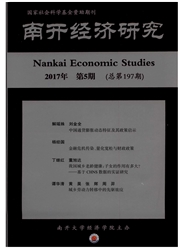

 中文摘要:
中文摘要:
本文利用1952—2008年中国29个省市的面板数据,运用两步系统广义距(Two—step system GMM)估计方法考察了工资对全要素生产率的影响。研究发现:1952—1978年,工资与全要素生产率之间的关系不明显;1979—2008年,工资通过劳动生产率对全要素生产率的影响显著为正,而通过资本生产率对全要素生产率的影响显著为负。本文进一步从劳动力市场发育程度和出口两个方面来探析工资与全要素生产率的偏离,结果显示劳动力市场发育不完善阻碍了工资作用的发挥,出口增加缓解了工资上涨企业寻求创新的动机。
 英文摘要:
英文摘要:
Using the Chinese province panel data of 1952—2008,the paper estimates the influence of wage on total factor productivity(TFP),through two-step system GMM method.We find that the relationship is not significant between wage and TFP,from 1952—1978;wage promotes the TFP significantly through labor productivity,and hampers the TFP significantly through capital productivity,from 1979—2008.The paper further studies the deviation between wage and TFP from the views of degree of Chinese labor market's development and export.The faultiness of Chinese labor market's development hampers the effect of wage on TFP.The rising export postpones the incentives of firm's innovation induced by ascending wage.
 同期刊论文项目
同期刊论文项目
 同项目期刊论文
同项目期刊论文
 期刊信息
期刊信息
